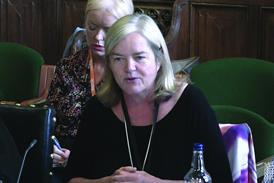The government’s long-awaited report on its controversial legal aid reforms may not be published this year, the Ministry of Justice has suggested - after lord chancellor David Gauke stressed that he does not want the review to slip into 2019.
Matthew Shelley, a deputy director at the Ministry of Justice, told an all-party parliamentary group on legal aid yesterday that his team will aim to finalise its 'staff assessment' of what has happened since the Legal Aid, Sentencing and Punishment of Offenders Act came into force in April 2013, by the end of the year. Pressed for further timetable details by Labour MP Andy Slaughter, Shelley said he could not commit to a specific day for when the report will be released.
Shelley told the meeting his team will review what has happened since LASPO across 34 reform areas, and 'we will also need to look at where we go from here'.
The team already has over 100 pieces of literature in its caseload of material, which continues to arrive 'thick and fast'. Shelley assured the meeting that officials will look at reports published by the Low and Bach commissions, as well as research by the Law Society. An independent strategic review of legal aid in Scotland will also be considered.
On Monday officials led a 'consultative group' meeting to discuss criminal justice. Discussions on family justice and the advice sector will take place today, and civil justice on Friday. A second round of meetings will take place before the summer recess, and a third in September or October.
However, Nicola Mackintosh QC (Hon), sole principal of London firm Mackintosh Law, which advises disabled clients on mental capacity and community care, told Shelley that the meetings provide insufficient time 'to cover what are very complicated areas of law'.
Inviting input from everyone in the room, Shelley warned that the 'only way I can make a convincing argument to our ministerial team is if we have got something proposing something we need to do to address some of these areas. The answer cannot be simply putting money back into the system and reversing the reforms'.
Earlier, the meeting heard concerns about an advice 'desert' emerging in family law. Olive Craig, family law adviser for Rights of Women, a charity which helps women through the law, said there were areas where no providers had successfully obtained a family law legal aid contract.
Rights of Women, with the support of the Law Society, successfully fought rules introduced in April 2013 that required domestic violence victims to provide a prescribed form of evidence to apply for family law legal aid. However, Olive Craig said the means test continues to be 'far too complex'. Prison law specialist Simon Creighton, founding partner of London firm Bhatt Murphy, said exceptional case funding was 'impossible' for prisoners, who cannot access the internet and obtain the relevant forms.
Garden Court Chambers barrister Jo Cecil said criminal barristers currently taking action in protest at legal aid reforms want to have a ‘constructive dialogue’ with the ministry. However, ‘in the alternative, one has to anticipate an escalation in the type of action undertaken’, she warned.
A 'vigil for justice' will take place outside the ministry's London headquarters at 7pm.



























5 Readers' comments